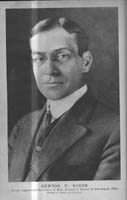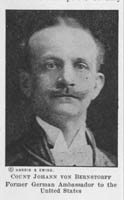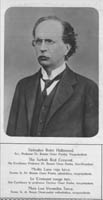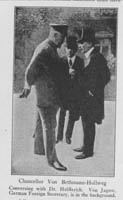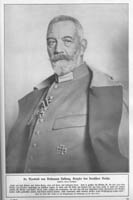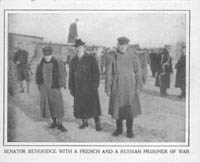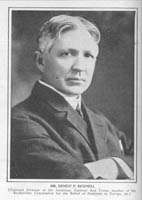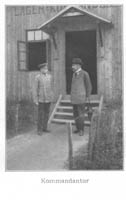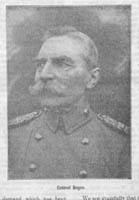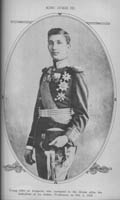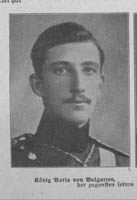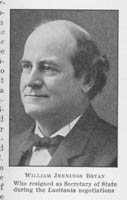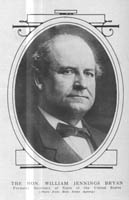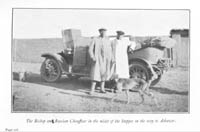Table of Contents
Key Figures
Statesmen
a | b | c | d-e | f | g | h-i | j-l | m | n-o | p | r | s | t-v | w-y
Newton Diehl Baker (1871-1937)
An American statesman, Baker was trained as a lawyer and practiced in Martinsburg, West Virginia and Cleveland. He became the City Solicitor of Cleveland in 1902 and was elected Mayor in 1912. When relations with Mexico and Germany began to deteriorate, President Woodrow Wilson appointed Baker Secretary of War in 1916. Baker supervised the American Army's mobilization in 1917 and the transportation and support of the American Expeditionary Force in Europe. Baker strongly supported the role of the American YMCA in providing relief services to American soldiers during the war, both at training camps at home and on the battlefield overseas. In 1928, Baker became a member of the Permanent Court of Arbitration at The Hague.
Major Bauer
A German officer during World War I, Major Bauer was assigned to the Department of Prisoners of War in the Ministry of War at the beginning of the war. In April 1916, he became a member of the German Committee for Assistance to Prisoners of War of the Young Men's Christian Associations, an organization developed by Archibald Harte that served as the model for other nations' War Prisoners' Aid programs. By the end of the war, the Ministry of War promoted Bauer to the rank of lieutenant colonel.
Herbert Eversley Belfield (1857-1934)
A British Lieutenant General, Belfield began his military career in Africa, participating in the Ashanti expedition of 1895-1896 in West Africa and Inspector General during the Boer War of 1899-1902. He retired from military service in 1914. With the outbreak of World War I, Belfield became the Director of Prisoner of War Work from 1914 to 1920, representing the British government at POW conferences with the Germans at Berne and the Hague. Belfield negotiated POW exchanges and the treatment of prisoners with the German and Ottoman Empires during the war.
General Beliaeff
A Russian general, Beliaeff was the Chief of the General Staff early in World War I. Archibald Harte met with Beliaeff and other Russian military leaders and nobility during his first POW diplomatic visit to Russia in May 1915. Harte explained the War Prisoners' Aid program in Germany and how it benefitted Russian POW's focusing on his hopes to expand WPA operations to Russia to assist Central Power prisoners. The Russians considered Harte's proposal and permitted the American secretary to tour Russian prison camps in Siberia.
Johann-Heinrich von Bernstorff (1862-1939)
A German statesman, Bernstorff entered German diplomatic service in 1889 and became the Councilor of the German embassy in London in 1902. He transferred to Cairo in 1906 as the Consul General and was promoted to German Ambassador to the United States in 1908. Bernstorff worked strenuously to keep the United States neutral after the war broke out in Europe in 1914 and supported President Woodrow Wilson's peace mediation efforts. He strongly advocated the YMCA's establishment and development of the War Prisoners' Aid program for POW's. Bernstorff attempted to improve relations between the U.S. and the Central Powers, but the U-Boot offensive undermined his initiatives. When the U.S. broke off diplomatic relations with Germany in February 1917, Berlin transferred Bernstorff to Constantinople where became the German Ambassador to the Ottoman Empire. After the Turkish armistice, Bernstorff returned to Germany and became a member of the Democratic Party in the Reichstag in 1921. After Germany joined the League of Nations in 1926, he became the chairman of the German League of Nations Union and Vice Chairman of the League of Nations. He represented the Weimar Republic at League disarmament conferences between 1929 and 1931.
Bessim Omer Pasha
A medical doctor and Vice President of the Red Crescent Society, Bessim Omer Pasha played an important role in the welfare of Allied prisoners of war held by the Ottoman Empire during the Great War. Bessim Omer Pasha participated in the January 1918 conference with Christian Phildius and other Turkish officials regarding World's Alliance access to prison camps to conduct War Prisoners' Aid relief operations in the Ottoman Empire.
Theobald von Bethmann-Hollweg (1856-1921)
A German statesman, Bethmann-Hollweg served as the imperial Chancellor for the first three years of World War I. He became the Secretary of the Interior in 1907 and succeeded Bernhard von Bülow as Chancellor in 1909. He supported the expansion of the Prussian franchise and greater autonomy for Elsass-Lothringen (Alsace-Lorraine). His domestic policies alienated both the conservatives and liberals in Germany and focused primarily on foreign policy. He unsuccessfully attempted to persuade the British to allow Germany to have a free hand in European politics and challenged the Russians in the Balkans. After the assassination of Archduke Franz Ferdinand of Austria-Hungary in June 1914, he failed to take an assertive role in the crisis and gave the Austro-Hungarians a free hand to deal with Serbia. With the outbreak of the war, the Chancellor referred to the Belgian Neutrality Treaty as a "mere scrap of paper" as German troops poured across the border in August 1914. While Bethmann-Hollweg clung to his blue print of German domination of Europe, he found himself at odds with the growing power of Field Marshal Paul von Hindenburg and General Erich Ludendorff. When the High Command decided to resume unrestricted submarine warfare, which would bring the United States into the war on the side of the Allies, Bethmann-Hollweg failed to persuade the Kaiser to reject the plan. Hindenburg and Ludendorff forced Bethmann-Hollweg out of office in July 1917 and replaced him with Georg Michaelis, the obscure Undersecretary of State. Hindenburg and Ludendorff were able to establish a virtual military dictatorship with the removal of Bethmann-Hollweg from the chancellorship.
Albert Jeremiah Beveridge (1862-1927)
Born in Ohio, Beveridge became a statesman and historian. From 1899 to 1911, Beveridge served as a U.S. Senator from Indiana as a Republican. He was a strong supporter of Theodore Roosevelt and unsuccessfully ran for Governor of Indiana in 1912 on the Progressive ticket. Beveridge conducted a tour of prison camps in France and Germany in 1915 and reported his findings in the press. He became a historian and wrote biographies of John Marshall and Abraham Lincoln.
Ernest Percy Bicknell (1862-1935)
An American welfare worker, Bicknell worked for six years as a newspaper reporter in Indianapolis, beginning in 1887. From 1893 to 1898, he served as the Secretary of the Indiana State Board of Charities and then moved to Illinois to become the General Superintendent of the Chicago Board of Charities. Following the April 1906 San Francisco earthquake, Bicknell supervised the distribution of relief funds collected in the Chicago area. In 1907, he was one of the U.S. delegates at the International Red Cross Conference in London. This marked the beginning of his long affiliation as an administrator with the American Red Cross. Starting in 1908, he served as the National Director of Civilian Relief for the Red Cross, headquartered in Washington, DC. In 1917, Bicknell became the Vice President of the American Red Cross and served as the Vice Chairman for Insular and Foreign Operations, he position he held until his death in 1935. During and after World War I, Bicknell spent long periods of time in Europe studying the relief needs of countries and refugees. He helped establish the Commission for the Relief of Poland in conjunction with the Rockefeller Commission during the Great War.
Colonel Bogen (d. 1917)
A German officer, Colonel Bogen was the commandant of the prison camp at Göttingen (III Army Corps) during the first three years of World War I. The Ministry of War selected his camp for the initial War Prisoners' Aid operations, which included the construction of the first YMCA hall for Allied prisoners of war. In March 1915, Archibald Harte and Christian Phildius visited the camp and Bogen expressed a great interest in the welfare of the camp population. The April 1915 inauguration of the YMCA hut was well attended by YMCA officials and foreign dignitaries.
Baron Captain von Bönigk
A German officer and nobleman, Freiherr Hauptmann von Bönigk was assigned to the Department of Prisoners of War in the Ministry of War at the beginning of World War I. He became a member of the German Committee for Assistance to Prisoners of War of the Young Men's Christian Association, an organization established by Archibald Harte which became the model of War Prisoners' Aid programs for other nations. Von Bönigk was included in the Special Executive Committee, with Conrad Hoffman, Prince Maximilian of Baden, Gerhard Niedermeyer, and Thomas Hall, which supervised the daily operations of the German WPA Committee.
Tsar Boris III of Bulgaria (1894-1943)
The eldest son of Tsar Ferdinand of Bulgaria, Boris was the Crown Prince during World War I. He supported the War Prisoners' Aid program in the kingdom and offered his patronage of the Bulgarian Branch of the WPA in December 1917. Boris ascended the throne of Bulgaria upon the abdication of his father in September 1918 after Allied forces had broken through the Salonika Front and overwhelmed the Bulgarian forces. Boris was the only Central Power king to save his crown after the World War I peace settlements. In 1930, Boris married Princess Giovanna of Italy, daughter of King Victor Emmanuel III. During the interwar years, Boris attempted to promote a neutral foreign policy in Balkan affairs, but revisionist politicians sought to restore Bulgaria's lost power. In 1940, Boris finally supported the government's decision to join the Axis powers and the kingdom regained territory from Romania and Yugoslavia. Boris died in 1943, possibly as the result of German intrigue.
William Jennings Bryan (1860-1925)
A leading Populist and Democratic political leader, Bryan was known as "The Commoner." He became a member of the House of Representatives in 1891 for Nebraska and embodied the Free Silver Movement. Nominated as the Democratic presidential candidate in 1896, he lost the election to William McKinley. The Democrats renominated Bryan on an anti-expansionist and anti-imperialist ticket, in response to American acquisition of the Philippines and Puerto Rico during the Spanish-American War, but Bryan again lost to McKinley in the election of 1900. Bryan became the Democratic standard-bearer for the third time in 1908, but lost to William Howard Taft, Theodore Roosevelt's hand-chosen successor. In the Democratic convention of 1912, Bryan strongly supported Woodrow Wilson and helped Wilson win the party's nomination. After winning the election, Wilson appointed Bryan as his Secretary of State in 1913. Bryan was the champion of neutrality in the administration when World War I erupted in Europe in August 1914. As a result of this stand, he initially opposed the YMCA's plans to undertake POW relief services as a potential violation of American neutrality. Bryan resigned as Secretary of State in 1915 in opposition to the Wilson's response to the German sinking of the Lusitania, a policy, he believed, would lead the United States into the European conflict.
Bishop Herbert Bury (1853-1933)
An Anglican bishop, Reverend Bury's bishopric consisted of Northern and Central Europe. Bury spent considerable time in Russia before the war and helped establish an Anglican church in Moscow. When World War I began, Bury worked on behalf of British prisoners of war in German POW camps. He conducted prison camp visits and coordinated relief services for their benefit. Bury supported the development and expansion of the War Prisoners' Aid program in the Central Powers.
